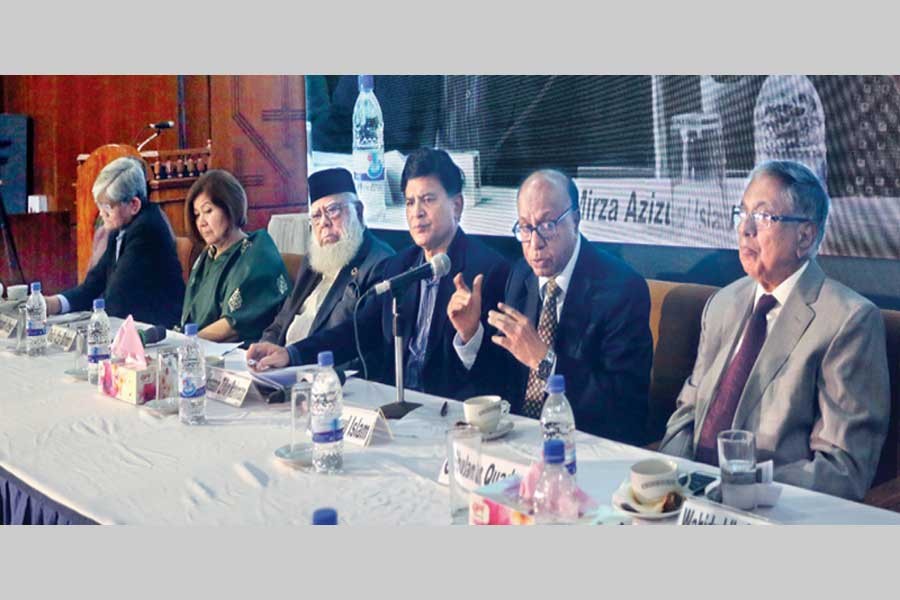
Published :
Updated :

Lack of accountability and governance in the state organs can fade Bangladesh's socio-economic progress in the coming years, experts warned on Saturday.
To overcome this unpleasant reality that badly hurts equality, they called upon all political parties and other constitutional bodies to promote these basic factors within themselves for sustainable economic growth.
Terming the country's remarkable progress 'business as usual', they said such activities would not be enough to achieve sustainable development goals (SDGs) by 2030.
To achieve the goals, participatory democratic activities in every area, institutional capacity and proper use of demographic dividend also need to be ensured, according to the experts.
The warning and observations came at the third theme 'accountable governance and empowering the grass roots' of a civic dialogue titled 'An Agenda for Bangladesh'.
Power and Participation Research Centre (PPRC) and International Chamber of Commerce (ICC) co-hosted the event in LGED auditorium in the capital.
Former election commissioner Brig Gen (retd) M Sakhawat Hussain said political parties are functioning here like a private organisation for no specific guideline in the constitution about formation of political party.
Despite making good progress on many socioeconomic fronts, the country is going backward for lack of a stronger political institution, which is a key for sustainable socioeconomic growth, he said.
Giving an example of the Election Commission, he said the commission cannot deliver accordingly despite having necessary set-ups.
"Where is the problem? The problem is no effort to institutionalise it. There is no act, rules and norms. So, anybody can come and sit," Mr Hussain added.
He said political and institutional progresses need to be linked with economic progress for a better output, which would be sustainable.
Former caretaker government adviser Maj Gen (retd) Ghulam Quader was critical of bureaucratic complexities in the development activities.
He said there is no provision of punishment in making any wrong decision in implementing development work, although it eats up time and resources.
Asif Ibrahim, former president of Dhaka Chamber of Commerce and Industry (DCCI), cited various business reform proposals taken in the past for ensuring a better business climate.
He said top-level political commitment was there, but the progress halted when it came to the lower level of bureaucracy.
"We need to change the mindset. Politics and bureaucracy will have to be delivered for the sake of economy," Mr Ibrahim added.
Dr Muhammad Abdul Mazid, ex-chairman of National Board of Revenue, said state-owned institutions do not perform independently as the government has virtually acquired the state.
"Many state entities are not paying taxes despite earning revenues while many of them are enjoying tax exemption facility unnecessary."
"We can take GDP [gross domestic product] to 10 per cent as 2.5 to 3.0 per cent are being looted by various forms," Mr Mazid added.
Prof Wahiuddin Mahmud said Bangladesh's socioeconomic progress started from the 90s but the country is gradually going backward in the global index of governance, which is a serious concern.
It successfully achieved the millennium development goals (MDGs) amid 'patronage politics' or lack of governance but the SDGs (sustainable development goals) would be much more challenging, he observed.
"Will such type of governance and non-accountability be enough to meet the SDG targets? Most probably no. we need to pay serious attention to these issues," Prof Mahmud said.
He highlighted the importance of reform in the revenue board to net down tax dodgers who create a hindrance to upholding governance.
Moderating the event, PPRC executive chairman Dr Hussain Zillur Rahman said Bangladesh made a remarkable progress in many areas over the years, but the way it is happening is "business as usual".
"Can business as usual take the GDP to double digit? Can it take us to the prestigious middle-income group? Can it help us ensure SDGs? Or we need changes?" he posed the queries.
To this end, Mr Rahman said, the civil society needs to send a strong and clear message to the government who will come to power after the upcoming election.
The former adviser to a caretaker government said the prime objective of power and ruling system is distribution of illegal facilities, which needs a change to attain equal and inclusive economic growth.
jubairfe1980@gmail.com


 For all latest news, follow The Financial Express Google News channel.
For all latest news, follow The Financial Express Google News channel.